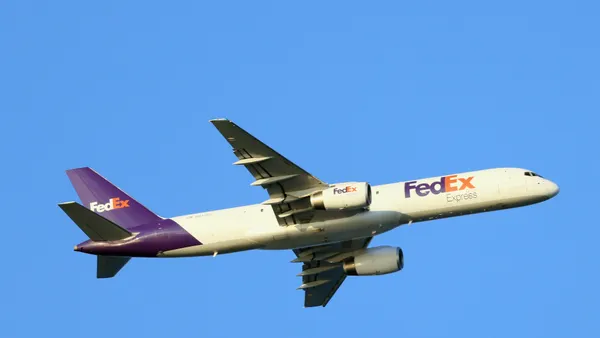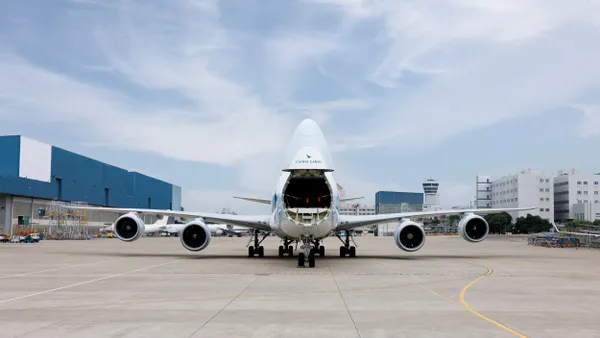Dive Brief:
- The Federal Aviation Administration (FAA) will allow cargo to be carried on the seats in the cabin of a passenger airplane if there are no passengers on board, according to an exemption issued by the agency Wednesday.
- The decision is meant to facilitate the movement of goods during the coronavirus pandemic, the agency said. Airlines for America, a trade association representing the airline industry, filed paperwork asking for the exemption on April 23.
- "This builds on FAA guidance allowing the carriage of cargo in overhead bins, under seats and in storage closets on passenger aircraft used in cargo-only flights," a spokesperson for Airlines for America told Supply Chain Dive in an email. "It will allow U.S. airlines to further augment the cargo capacity normally provided by passenger flights and support emergency response efforts." The FAA originally provided guidance to airlines in April, but it didn't include details on carrying items in the seats of a passenger airline.
Dive Insight:
The pandemic has brought the business of passenger flights to its knees. In its request for an exemption, Airlines for America said its members have seen passenger traffic fall 96% compared to last year, and about 2,900 aircraft have been parked.
Meanwhile, the passenger planes pulled from the market were an important part of the air cargo ecosystem. As of March, the most recent data available, international belly cargo capacity fell almost 44% year over year while dedicated freighter rose more than 6% year over year, according to the International Air Transport Association (IATA).
The loss of capacity has resulted in skyrocketing air cargo rates. The price to ship between China/Hong Kong and the United States has increased from $3.49 per kilogram on March 9 to $9.41 per kilogram as of May 18 (a nearly 170% increase), according to numbers from the TAC Index.
Airlines for America had asked for the exemption to remain valid until April 30, 2022, but the FAA said it will only hold through Dec. 31, 2020. The agency said the provision can be extended "if warranted and under appropriate conditions and limitations."

Airlines for America argued in its request that an exemption would open up more capacity for airlines to transport critical medical supplies to hospitals and medical centers.
"The FAA agrees that this relief is in the public interest because it supports the continuity of air transportation, which is essential, especially during this national emergency," the agency said in partially granting the exemption.
There are a number of stipulations placed on how cargo would be carried on passenger seats, including weight limits and ensuring the cabin is still accessible to fire crews in an emergency.
Multiple passenger airlines have already begun flying cargo-only flights.
"We've also flown over more than 800 cargo-only flights worldwide, bringing more than 28 million pounds of a variety of cargo goods, such as food, healthcare-related items and supplies to destinations worldwide," United Airlines CEO Oscar Munoz said on the company's earnings call earlier this month.
American Airlines President Robert Isom said last month the company was carrying 6.5 million pounds of critical goods weekly on cargo-only flights and that the company would "look for further opportunities to expand the service."
"While we have reduced our schedule dramatically, we started operating cargo-only flights in March to transport critical goods between the U.S., Europe, Asia and Latin America," Isom said. "These are the first cargo-only flights American has operated since at least 1984."













